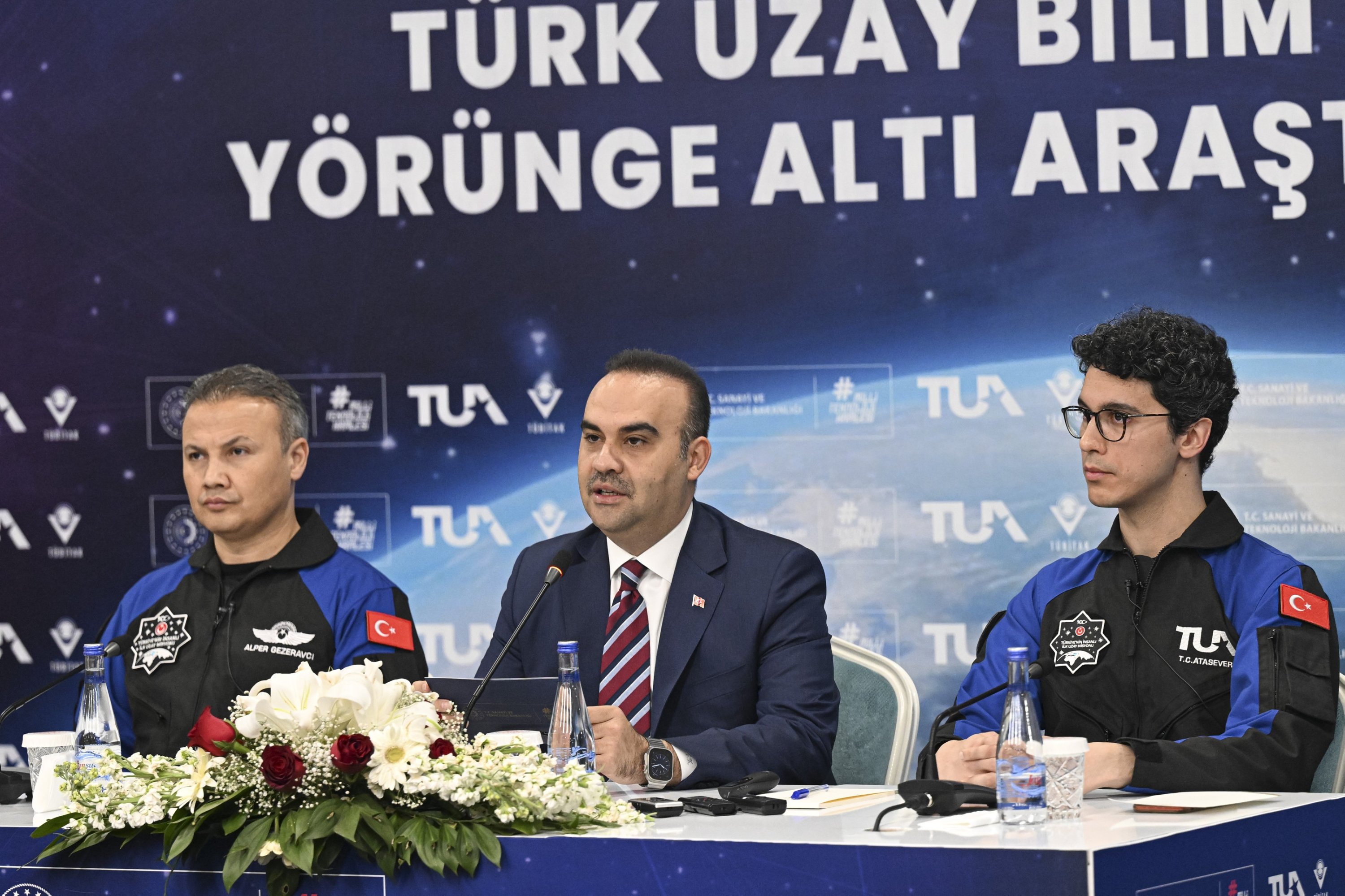© Turkuvaz Haberleşme ve Yayıncılık 2024
The suborbital research flight of Tuva Cihangir Atasever, Türkiye's second astronaut, will take place on June 8 from Virgin Galactic's Spaceport facilities in the U.S. state of New Mexico, Industry and Technology Minister Mehmet Fatih Kacır announced in a statement.
Kacır held a news conference at the ministry with Türkiye's astronauts Alper Gezeravcı and Atasever, titled "Turkish Space Science Mission Suborbital Research Flight."
Kacır indicated that they are opening a new chapter in Türkiye's space journey with the "Turkish Astronaut and Science Mission," saying: "In the past 22 years, under the leadership of our president, we have made the biggest investment in our human resources, strengthening our R&D and innovation infrastructure. Focusing on paradigm shifts in technology, we have elevated our research, development and production capabilities, achieving lasting gains in many fields. With the technology ecosystem we have built, we are more than ready to take advantage of the limitless opportunities space offers."
Kacır also noted that Türkiye is now capable of developing, producing and testing its own satellite, stating that with the İMECE satellite completing its first year, images can be obtained from anywhere in the world without any restrictions.
Kacır reiterated that they will send the domestic and national communication satellite TÜRKSAT-6A into space during the week of July 8, stating: "With TÜRKSAT-6A, we will be one of 11 countries capable of developing and producing communication satellites."
Kacır pointed out that space technologies are not limited to satellites, mentioning that they declared the National Space Program to protect the country's rights and interests in space and to become a significant player in the global space race.
Stating that they have identified 10 objectives within the program, Kacır said: "One of these objectives is the 'Turkish Astronaut and Science Mission.' We experienced moments of great pride with Alper Gezeravcı's space mission, which was part of Türkiye's first manned space mission. This science mission contributed significantly to the scientific community with 13 experiments ranging from genetics to biology, from physiology to the immune system, and has been an inspiration to our youth looking towards the future."
Kacır reported that the space mission is a new beginning for Türkiye toward becoming a scientific community.

Kacır highlighted the beginning of a new era in space science and technologies for Türkiye and added: "Our other astronaut Tuva Cihangir Atasever's suborbital research flight is next in line. Just as we took pride in Alper Gezeravcı's historic space journey, we are also very excited about Atasever's suborbital research flight."
"Our astronaut Atasever's suborbital research flight will take place on June 8, 2024, from Virgin Galactic's Spaceport facilities in New Mexico, USA. This flight, planned to last about 1.5 hours, will see the 'VSS Unity' suborbital vehicle carrying our astronaut reach an altitude of approximately 45,000 feet with the help of a carrier aircraft, then ignite its hybrid rocket motor to reach an altitude of approximately 90 kilometers (55.92 miles). During the approximately three-minute free-fall phase in microgravity conditions, it will be possible to conduct seven experiments ranging from biological molecules to genetic analyses, metabolism changes to suppressive cells, insulin pens to radiation analysis," he added.
Kacır noted that Atasever's experiments across various disciplines will yield significant gains for researchers.
Reiterating that both astronauts received basic astronaut training from Axiom Space, SpaceX and NASA, including safety procedures, module and experiment equipment usage and survival training, Kacır mentioned: "There were no obstacles to Gezeravcı's mission. Gezeravcı successfully completed our first manned space science mission. As agreed upon in the project contracts from the outset, this allowed our second astronaut, Atasever, to conduct a suborbital research flight and experience space without incurring additional costs, thus making Atasever our second citizen to cross the space frontier and contribute to scientific research in microgravity conditions."
Kacır emphasized their meticulous efforts to ensure that every investment and project they implement provides the utmost benefit to the country and its citizens.
He mentioned that they will continue their efforts toward the goals of the National Space Program following the suborbital research flight. He stated: "As a symbol of peace and cooperation in space, we will continue international collaborations in the coming period. As a reflection of international cooperation, the Axiom-3 mission team will gather in our country at the beginning of June. They will share their experiences in space and future projects with our youth at universities."
Kacır also mentioned their plans to establish a space technology development zone in Ankara, enhance the space industry and aim for a larger share in the global space economy estimated to reach $1.8 trillion by 2035.
Regarding the independent space access program, Kacır indicated: "We will continue our projects to develop launch rockets and establish a spaceport through international collaborations by 2030. During this process, we will carry out our Moon Program, with our domestically developed propulsion system, designed and produced by our engineers and scientists, we will reach the moon. We will have the opportunity to use innovative technologies developed under challenging space conditions and commercialize them later. We will also complete the Eastern Anatolia Observatory Project under the Türkiye National Observatory framework, which will have the most advanced telescope in our region for advanced space observations."
Kacır also mentioned their ongoing organization of the world's largest aviation, space and technology festival, Teknofest. Through rocket and satellite competitions, education, and entrepreneur support programs, they aim to strengthen human resources in space science and technologies and continue to increase societal interest in space. He also addressed a question about sending the championship football team's flag to space saying: "If there is a consensus request from the sports community, we will make efforts on behalf of our nation to fulfill it. However, seeing our crescent and star flag in space would undoubtedly be the most joyous for all teams."
